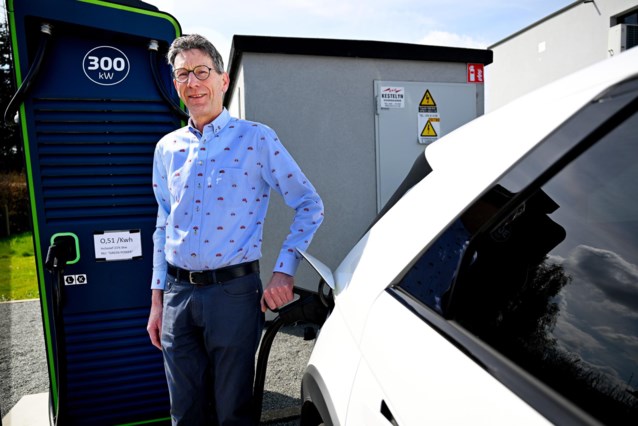Remarkable action at a (fast) charging station for electric cars: filling up your battery costs a lot less when the weather is sunny. “Smart charging is the future,” says the expert. “Everyone has to participate, including small entrepreneurs.”
At Eric De Witte’s Powerland station in Deinze, a kilowatt cost 64 cents yesterday morning. In any case, a lot cheaper than most fast charging stations along the motorway. But at exactly 10 am – and until 5 pm – the price fell sharply to 51 cents. “I can almost compete with the prices of the slow charging stations that are everywhere on the street. But here people charge much faster, up to 150 or 300 kilowatts per hour.”
De Witte has a variable energy contract for his station near the E17 exit, halfway between Ghent and Kortrijk. “The price is determined per hour, and becomes cheaper if there is oversupply.” This is the case, for example, if there is a lot of sun and a lot of wind, and solar panels and wind turbines are working overtime. Or on weekends, when much of the industry comes to a standstill. “Every evening at 6 p.m. I know what the price will be the next day. For example, I knew on Thursday evening that I would have low prices on Friday from 10 am to 5 pm.”
Myth
De Witte then has two choices. The most logical seems to be the one where he keeps his prices and goes for profit maximization in his station. “But I don’t do that,” he says. “I pass on the discount I receive to my customers. My profit may be lower, but I can hopefully ensure that more people take advantage of the promotion and thus generate more turnover.”
“The price is determined per hour, and becomes cheaper if there is oversupply”
Eric White
Charging and pumping station operator
And there is also an educational component for its customers. “Thanks to the digital meter and the capacity rate, people are already well informed about how the energy market works today. But they can still learn. By looking at the weather forecast, for example.” The pumping station operator currently generates 5 percent of its turnover from electric charging. The majority of customers still fill up with diesel or petrol. “With my campaign I also want to remove fast charging from the bad light. The biggest prejudice is that it is expensive. I am doing something about that: it is not always expensive. And that it is bad for your battery is also a myth.”
The campaign also includes an educational component, according to pump station operator Eric De Witte: “People must learn to look at the weather forecast.”
“Everyone has to come along”
Helena Gerard from research organization VITO/EnergyVille is enthusiastic about the initiative. “We all have to start charging at a time when there is an energy surplus,” she says. “We avoid that people all load in the evening, when there is no sun and everyone comes home and starts cooking. Smart charging is the future. But people will only do that if they have one incentive get for. Preferably a discount that is passed on, as in this case.”
“Smart charging is the future. But people will only do that if they get an incentive to do so”
Helena Gerard
VITO/EnergyVille
And the fact that small entrepreneurs are also jumping on the bandwagon is to be welcomed. “The energy transition requires a new way of working. And it cannot be the sole responsibility of policy. Everyone has to come along. Also entrepreneurs who are close to the people, because there is no one solution. Every innovation that pushes the energy system in the right direction helps us move forward.”
